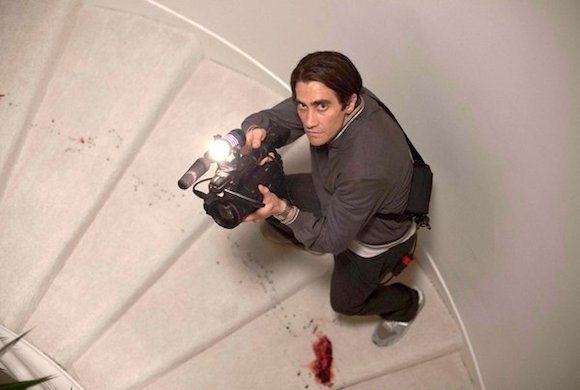Dan Gilroy’s recent thriller Nightcrawler is a shattering critique of both modern-day media practice and consumer culture. It is driven by the performance of Jake Gyllenhaal, who gives one of the great portrayals of psychopathy in modern cinema.
The film has not impressed some critics. Luke Davies of The Monthly argues that the audience is never ‘implicated in the voyeurism’ it depicts. AO Scott of The New York Times calls it ‘slick and shallow’. Margaret Pomeranz from ABC’s At the Movies says this kind of media satire has been ‘done to death’.
Such denunciations are unconvincing but hardly surprising. Nightcrawler – the title refers to the work of freelance camera operators who attend unfolding crime and accident scenes around Los Angeles – not so much gets under the viewer’s skin as injects itself into their bloodstream. It makes us feel grubby by implication and media-based critics are likely to come away especially tainted as their industry is the primary target.
Unlike the standard movie psychopath/sociopath – of which Anthony Hopkin’s Hannibal Lecter is the archetype – Gyllenhaal’s Lou Bloom exists because we, the audience, have created him. Ultimately, the reflection we see in his skittish, bulbous, screen-like eyes is one of ourselves.
Most filmic deviants are situated at a distance from civilised society; they make us feel better about ourselves because we are not them. Here, however, the fundamental reason for Bloom’s sudden career success – he goes from neophyte operator to the most sought after supplier of on-the-spot blood and gore in a matter of weeks – is consumer demand. His project is a reflection of the symbiotic relationship between commercial imperatives and audience desire.
Lou Bloom digests mass culture and then regurgitates it back all over us, spurting out insipid middle management platitudes and inane tabloid morality at every turn. He adds to the discomfit by being the consummate narcissist, as epitomised through a line uttered during what is surely one of the most awkward first dates in cinema: ‘a friend is a gift you give yourself.’
When he creeps through a multiple murder scene, filming the fresh kills before even the police have arrived, he is remote, robot-like – his only thought is getting the angles and framing right. Only when playing back the footage on his laptop shortly afterwards does he suddenly shudder at the thrill of it all. In Bloom’s world it is on screen where the essential reality of things is finally revealed.
In his excellent review for The New Yorker, Anthony Lane points out that Bloom’s name suggests a connection to the street-roving Leopold Bloom of James Joyce’s Ulysses. Perhaps another literary figure evoked here is the malevolent Judge Holden of Cormac McCarthy’s apocalyptic Blood Meridian.
Like the Judge, Lou Bloom seems omnipotent. He is never seen to sleep. Moreover, both Holden and Bloom appear invincible. As Gyllenhaal’s character films the final car crash scene, he is confronted by an armed killer who has just shot several people. Yet the murderer turns away, preferring instead to face the approaching police. It seems he, like all of us, has come to realise that the camera’s all-seeing eye cannot be extinguished.
Gilroy makes remarkable use of mise-en-scène, sound and editing to ensnare the audience in the web of everyday electronic media that it crawls upon. To take all of this away is unthinkable because it is the new authenticity. In front of a huge filmed wall of Los Angeles by night, Bloom enthuses to television news director Nina Romina (Rene Russo) how ‘on TV it looks so real’.
Russo is excellent here, conjuring Faye Dunaway’s Oscar-winning performance from Sidney Lumet’s Network (1976) then taking this even further with her creepy ambitions. She shrieks in anger when these look like being unfulfilled, but drops down to a salacious purr whenever Bloom plies her with suitably grotesque imagery. Riz Ahmed also plays a vital role, adding humour as Lou’s bemused ‘executive vice president’ Rick.
The narrative of Nightcrawler hovers in a netherworld of moral ambiguity. Although Bloom crosses into criminality at times (perhaps a little too obviously when he fatally sabotages a competitor’s vehicle), the truth is that in the thrill-hungry commercial broadcasting world there is plenty of room for rule-bending. Russo’s Nina – a woman after Charles Foster Kane’s heart – is at the forefront here, directing operations in the news room to ensure that the endless repetitions of bloody imagery on show remain just inside the boundary of what is legally (though not morally) permissible.
Gilroy’s film is clearly far more than just an expose of the ethical wilderness of the corporate media. In 1963, German philosopher Theodor Adorno wrote that ‘the power of the culture industry’s ideology is such that conformity has replaced consciousness’.
Half a century on, the heedless conformity of much media consumption remains irrefutable. Nightcrawler hones in on the way news organisations beguile extreme raw footage into digestible chunks before feeding it to viewers via a formula of crushing banality. In a century where a profit-deranged and intensely propagandistic mass media has become the norm, this is at least in part because it perpetually serves up what its audiences crave.
While Nightcrawler flirts with implausibility, it always remains on the side of the credible. How could it not with the excesses of the Murdoch phone-hacking scandal so fresh in the mind? Tabloid journalism’s key strategy of keeping society poised on the cusp of moral panic provides all of the validation this film needs.
Nightcrawler stands alongside JC Chandor’s Margin Call (2011) as one of the finest directorial debuts of recent years. And like Margin Call, it is a highly effective exploration of extreme capitalism and contemporary morality.






